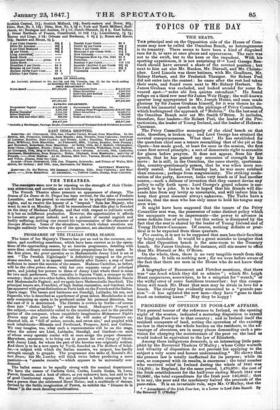TOPICS OF THE DAY
THE SEATS.
THE principal seat on the Opposition side of the House of Com- mons may now be called the Omnibus Bench, so heterogeneous is its tenantry. There seems to have been a kind of disguised race for it, to save at once places and appearances. The race was not to the swift, but to the keen or the impudent. With his sporting experiences, it is not surprising: th•>t Lord George Ben- tinck should have secured a share of the coveted position ; but next to him sat also Mr. Bankes Mr. Disraeli and Mr. Christo- pher. Lord Lincoln was there betimes, with Mr. Goulburn, Mr. Sidney Herbert, and Sir Frederick Thesiger. Sir Robert Peel did not enter into the contest : he came after the rest had taken their seats, and found room next to Mr. Sidney Herbert. Sir James Graham was excluded, and looked around for some fa- voured spot—." sedes ubi fats quietas ostendunt." He found refuge on a third row near Sir James Weir Hogg; the well-known quarter long appropriated to Mr. Joseph Hume, and once made glorious by Sir James Graham himself, for it was thence he de- livered his immortal speech on the pickings of Privy Councillors, which harbingered the approach of "Reform." On the last seat of the Omnibus Bench now sat Mr. Smith O'Brien. It includes, therefore, four leaders—Sir Robert Peel, the leader of the Pro-. tectionists, the leader of Young Ireland, and the leader of Hebrew. Caucasus.
The Privy Councillor monopoly of the chief bench on that side, therefore, is broken up ; and Lord George has attained the coveted conspicuousness. What then ? He has established for the quondam chief seat a tenure resembling that of the pit at the Opera—has made good, at least for once in the session, the first come first served principle ; a sort of democratic right to scramble for places before prayers. It does not appear, from his first speech, that he has gained any accession of strength by his move : he is still, in the Omnibus, the same sturdy, sportsman- like, country-gentlemanly person, that he was vhen more mo- destly seated. Indeed, on Tuesday last, he was more subdued than common ; perhaps from magnanimity. The striking mode- ration of the party, however, looks very much as if had another source,—such a dulness of invention that they cannot devise any policy to sally forth upon : Lord George's grand scheme is sus- pected to be a joke. It is to be hoped that his friends will dis- suade him from any levity so unsuitable, and will induce him to keep that great measure always unknown. The Turks have a maxim, that the man who has only sense to hold his tongue may seem wise.
It might have been supposed that the tenure of the Privy Councillor seat was, the possession of some distinct policy which the occupants were to impersonate—the power to advance in some definite line of action : but this notion is dissipated by the fact that the seat is shared by the leader of Youno. Ireland and of Young Hebrew-Caucasus. Of course, nothing definite or prac- tical is to be expected from those quarters.
Per contra, it is not to be supposed that men lose their faculties by being excluded. It would be a great mistake to imagine that the chief Opposition bench is the ante-room to the .Treasury bench. Sir James Graham, for instance, still sits nearer to office than Mr. Disraeli or Mr. O'Brien.
On the whole, then, there is no very tangible result from this revolution. It tells us nothing new • for we were before aware of the fact that there are men in the House who do not know their places. A biographer of Beaumont and Fletcher mentions, that there was "one bench which they did so admire " ; which Mr. Leigh Hunt conjectures, somewhere, to be a misprint for "wench," or the wilful error of some fastidious transcriber: but this compe- tition will teach Mr. Hunt that men may be rivals in love for a bench. The rivalry has evidently amounted to a " grande pas- sion "—it has agitated the new men—they have "gone to their bench on tottering knees." May they be happy !


























 Previous page
Previous page